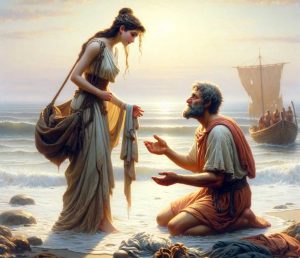Odysseus on the island of the Phaeacians
The story of Odysseus’s encounter with Nausicaa occurs during his long journey back to Ithaca, detailed in Homer’s epic, “The Odyssey.” This episode takes place on the island of Scheria, home to the Phaeacians, and unfolds a crucial turning point in Odysseus’s quest to return home.
The Shipwreck and the Princess

Nausicaa, the daughter of King Alcinous and Queen Arete of the Phaeacians, comes to the shore the next morning with her maids to wash clothes. After finishing their chores, they start playing with a ball, and their laughter awakens Odysseus.
Desperate and disheveled, he approaches Nausicaa, who stands out for her beauty and grace. Despite the initial shock of seeing a strange man, Nausicaa’s compassion overcomes her fear.
Wisdom and Compassion of Nausicaa
Nausicaa, showing wisdom and maturity beyond her years, decides to help the stranger. She provides Odysseus with clothing and food, instructing him on how to approach the Phaeacian court to seek help for his journey home. Nausicaa’s actions are guided by a blend of hospitality—a paramount virtue in ancient Greek culture—and a possible gentle fascination with the heroic figure of Odysseus.
Odysseus praises Nausicaa for her wisdom and kindness, comparing her favorably to a young palm tree, a symbol of grace and beauty. However, to protect her reputation, Nausicaa suggests Odysseus make his way to the palace separately from her and her maids.
Following Nausicaa’s advice, Odysseus heads to the palace of King Alcinous and Queen Arete. There, he is received with great hospitality. Odysseus recounts his adventures to the Phaeacians, who are known for their love of storytelling and seafaring. Moved by his story, King Alcinous offers Odysseus a ship and crew to ensure his safe return to Ithaca.
The encounter with Nausicaa and the Phaeacians represents a moment of peaceful interlude in Odysseus’s otherwise perilous journey. Nausicaa’s character embodies the ideal of xenia (hospitality) and plays a pivotal role in setting Odysseus on the final leg of his journey home. This episode highlights themes of kindness, respect, and the mutual benefits of helping strangers.
Furthermore, the story of Nausicaa subtly explores the complexities of human interactions, including the nuances of gender dynamics and the power of first impressions. Odysseus’s respectful approach to Nausicaa, coupled with her compassionate response, serves as a model of dignified behavior in uncertain situations.
In essence, the story of Odysseus at the island of Scheria, and his encounter with Nausicaa, adds a layer of depth to “The Odyssey,” emphasizing the humanity and interconnectedness of its characters, while steering the narrative towards its ultimate conclusion — Odysseus’s long-awaited return to Ithaca.
Nausicaa’s Character
Nausicaa is a character from Homer’s “Odyssey,” a princess of the Phaeacians in the island kingdom of Scheria. She is the daughter of King Alcinous and Queen Arete, rulers of the Phaeacians, a seafaring people famed for their hospitality and love of games. Nausicaa plays a pivotal role in the epic during Odysseus’s long journey back to his homeland of Ithaca after the Trojan War.
Nausicaa is introduced in the Odyssey as a compassionate, wise, and remarkably mature young woman. She encounters Odysseus when he is washed ashore on Scheria, naked and destitute, having been shipwrecked by the god Poseidon. Despite the potential impropriety of the situation and the initial fear that might be expected from encountering a stranger under such circumstances, Nausicaa demonstrates remarkable poise and kindness.
Guided by a dream sent by the goddess Athena, Nausicaa goes to the river mouth to wash clothes with her handmaidens. After their work and play, they rest, and it’s then that Odysseus, seeking help, approaches them. Nausicaa, rather than succumbing to fear or disgust at Odysseus’s dire state, shows empathy and generosity. She gives Odysseus clothing and food, and instructs him on how to appeal to her parents for assistance.
Her actions are governed by the ancient Greek code of hospitality, or xenia, which was of paramount importance in Greek culture. Xenia involves the protection and hospitality towards strangers or guests, often seen as a sacred bond between host and guest, and was believed to be under the protection of Zeus himself.
Nausicaa also displays wisdom and foresight by advising Odysseus on how to approach her parents to ensure the best possible outcome for his request for aid. Her guidance directly leads to Odysseus receiving the help he needs to finally return home to Ithaca.
In addition to her role in aiding Odysseus, Nausicaa is often remembered for her purity and the potential romantic tension in her encounter with Odysseus. While there is an implicit suggestion of a possible match between Nausicaa and Odysseus, particularly from Nausicaa’s mother, Queen Arete, the narrative does not pursue this storyline. Nausicaa remains a symbol of youthful innocence and the potential for new beginnings.
Nausicaa’s character has been interpreted in various ways throughout literature and art, often embodying ideals of kindness, hospitality, and the bridge between adolescence and adulthood. Her story within the “Odyssey” remains a testament to the importance of compassion and assistance to those in need, as well as the complex interactions and respect between individuals from different worlds.
